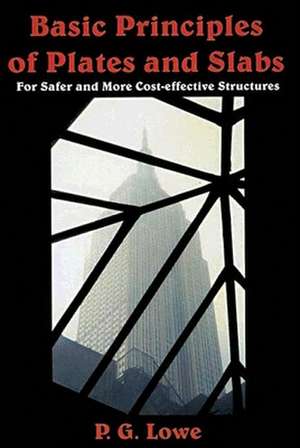Basic Principles of Plates and Slabs
Editat de Peter Loween Limba Engleză Hardback – 31 oct 2005
The early chapters discuss kinematics and statics, then the theories of elastic and plastic plates and slabs are developed and studied. The novel methods described are capable of providing 'safe' lower bounds on the collapse loads for a wide range of shapes and types of floor. Then follows a discussion of what criteria should be met by a construction method. These criteria are used to develop design principles for what is termed the 'preferred method of construction'. Worked examples and exercises are provided throughout. The final sections include more lengthy exercises, an extensive, annotated bibliography and some brief historical notes on the evolution of the subject.
Preț: 709.30 lei
Preț vechi: 875.67 lei
-19% Nou
Puncte Express: 1064
Preț estimativ în valută:
135.74€ • 141.54$ • 112.81£
135.74€ • 141.54$ • 112.81£
Carte indisponibilă temporar
Doresc să fiu notificat când acest titlu va fi disponibil:
Se trimite...
Preluare comenzi: 021 569.72.76
Specificații
ISBN-13: 9780849396427
ISBN-10: 0849396425
Pagini: 247
Dimensiuni: 162 x 240 x 22 mm
Greutate: 0.69 kg
Ediția:1
Editura: CRC Press
Colecția Imprints CRC Press - only for PT Products!
ISBN-10: 0849396425
Pagini: 247
Dimensiuni: 162 x 240 x 22 mm
Greutate: 0.69 kg
Ediția:1
Editura: CRC Press
Colecția Imprints CRC Press - only for PT Products!
Textul de pe ultima copertă
Floor structures account for the majority of all structural material incorporated into a typical building and plate theories provide the information required to design them. This comprehensive book provides a wide-ranging account of the theoretical aspects of plate and slab theory - in essence structural floors - followed by a discussion of the construction and design of real plate and slab elements.
The early chapters discuss kinematics and statics, then the theories of elastic and plastic plates and slabs are developed and studied. The novel methods described are capable of providing 'safe' lower bounds on the collapse loads for a wide range of shapes and types of floor. Then follows a discussion of what criteria should be met by a construction method. These criteria are used to develop design principles for what is termed the 'preferred method of construction'. Worked examples and exercises are provided throughout. The final sections include more lengthy exercises, an extensive, annotated bibliography and some brief historical notes on the evolution of the subject.
The early chapters discuss kinematics and statics, then the theories of elastic and plastic plates and slabs are developed and studied. The novel methods described are capable of providing 'safe' lower bounds on the collapse loads for a wide range of shapes and types of floor. Then follows a discussion of what criteria should be met by a construction method. These criteria are used to develop design principles for what is termed the 'preferred method of construction'. Worked examples and exercises are provided throughout. The final sections include more lengthy exercises, an extensive, annotated bibliography and some brief historical notes on the evolution of the subject.
Descriere
Floor structures account for the majority of all structural material incorporated into typical buildings, and plate theories are the foundation for designing them. This book presents the theoretical aspects of plate and slab theory, followed by a discussion of the construction and design of real plate and slab elements. The author describes some novel methods capable of providing 'safe' lower bounds on the collapse loads for a wide range of shapes and types of floor. He includes a discussion of the criteria that a construction method must meet and uses these criteria to develop design principles for the preferred method of construction. Worked examples and exercises are provided throughout.
